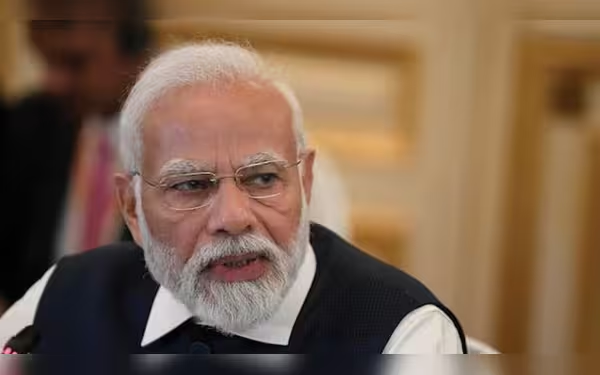Thursday, November 7, 2024 05:57 AM
Modi's Populism Threatens India's Fiscal Stability
- Modi's government increases cash handouts amid electoral losses.
- Rising populism risks India's fiscal stability and infrastructure projects.
- Opposition parties promise freebies, complicating economic recovery.
 Image Credits: geo
Image Credits: geoPM Modi's increased cash handouts post-electoral losses raise concerns over India's fiscal stability and long-term economic health.
In recent months, Indian Prime Minister Narendra Modi has faced significant challenges following electoral setbacks. After losing its parliamentary majority in the national elections held between April and June, Modi's Bharatiya Janata Party (BJP) is now grappling with the potential for further losses in upcoming state elections. In response to these challenges, the government has ramped up cash handouts, debt waivers, and various other financial incentives, despite Modi's previous criticisms of such populist policies.
The implications of these financial measures are profound. Analysts warn that the increasing handouts from state governments, coupled with promises from opposition parties to match these offerings, could jeopardize the fiscal stability of India, the world's most populous nation. This situation poses a risk to essential spending on urban infrastructure and other critical development projects. For instance, Maharashtra, India's wealthiest state, has raised its fiscal deficit target to 2.6% of its GDP for the current fiscal year, up from 2.3% in an interim budget earlier this year. The state has also introduced cash handouts for women and free electricity for certain farmers, which could cost approximately 960 billion rupees (around $11.45 billion) this fiscal year.
Moreover, Haryana, another state governed by the BJP, has implemented measures such as waiving water dues for farmers and reducing cooking gas prices for low-income families. These actions come in the wake of rising inflation, unemployment, and rural distress, which were pivotal issues during the general elections. Surveys indicate that these concerns remain at the forefront as the state elections approach.
Economist Madhavi Arora from Emkay has expressed concern over the current trend of populist promises across the political spectrum. She stated, "Although doles are not a new phenomenon, it is the prevalence of populist promises in this cycle across the political spectrum that is worrying." The recent surge in populist spending could disrupt the delicate fiscal balance that has been maintained thus far.
Opposition parties are also making bold promises, including free electricity for households and monthly allowances for women. Modi himself has previously warned against the dangers of a culture of freebies, stating, "This culture of freebies is very dangerous for the development of the country." He emphasized that such policies could hinder the construction of vital infrastructure like expressways and airports, as they create a dependency on government handouts.
Yashwant Deshmukh, the founder of polling agency CVoter, noted that politicians are likely to continue resorting to freebies, especially in light of growing economic disparities. He remarked, "The fiscal consequence of this culture is devastating, but there is a big yearning among the masses for such social welfarism." This highlights a complex dilemma: while the immediate appeal of financial assistance is undeniable, the long-term consequences for the economy and development could be severe.
As India navigates these turbulent political waters, the balance between populism and fiscal responsibility will be crucial. The current trend of increasing cash handouts may provide short-term relief to many citizens, but it raises significant questions about the sustainability of such policies. Ultimately, the challenge lies in finding a way to support the populace without compromising the nation's economic future.













